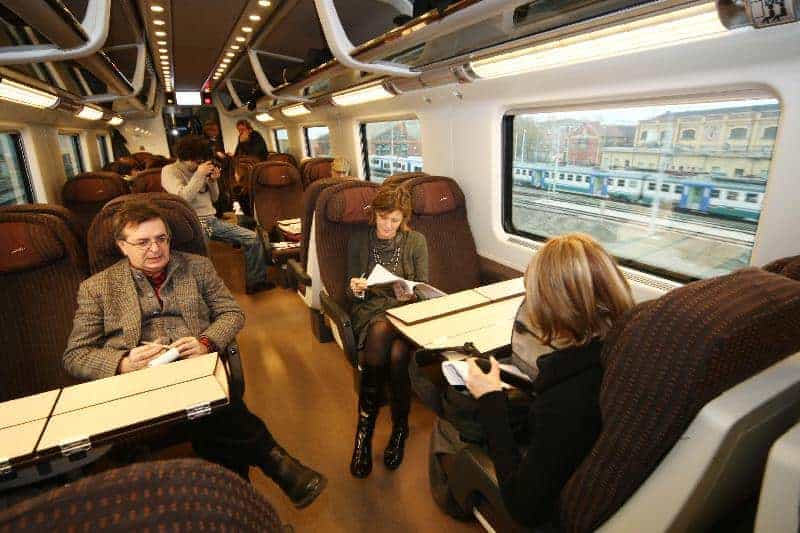The below Oct. 15, 2020 press release is from the Metropolitan Transportation Authority (MTA) of New York.
The Metropolitan Transportation Authority (MTA) today announced that Metro-North Railroad and the Long Island Rail Road are piloting a new technology to filter and purify air inside rail cars using an electrical field to generate a wave of ionized particles that destroy airborne viruses, bacteria and particulate matter, including COVID-19. The MTA is the first transit agency in North America to test the technology.
The pilot follows a successful proof-of-concept conducted by Metro-North over the summer. The air filtration and purification system, which was developed by Westminster, Md.-based Knorr Brake Company and its Merak North America division, is incorporated into the railroads’ existing ventilation systems. It enhances in-car air filtration – which already filters air 30 times an hour or once every 120 seconds, exceeding CDC [Centers for Disease Control and Prevention] standards for certain medical facilities and far surpassing standards for classrooms and restaurants.
In partnership with the MTA, researchers with the U.S. Environmental Protection Agency will test the technology to determine effectiveness in meeting the needs for public transit.
“As more and more customers return to Metro-North trains, they want to be confident that we are doing everything that we can to keep them safe and healthy,” said Metro-North Railroad President Catherine Rinaldi. “If the pilot proves successful, not only does this new air purification technology kill COVID-19, it kills any virus including the standard flu or bacteria that cause the common cold, and even particulate matter like diesel fumes. The benefits provided by this new system would last well after the pandemic has ended.”
About one-third of the air traveling through the ventilation system is fresh air pulled from above the roof of the cars. The system totally replaces the air inside a car 12 times an hour, or about once every five minutes.
“This addition to our ventilation would be completely invisible to the customers,” said Metro-North Chief Mechanical Officer James Heimbuecher. “We like that it can be incorporated into our existing ventilation systems with minimal intrusion. If this pilot proves successful, our crews are ready to begin adding this system across our entire fleet.”
Introduction of the technology has emerged through the MTA’s “COVID Response Technology” that was announced in July to engage the private tech industry and rapidly evaluate and deploy innovative technologies that make public transit safer, healthier and more responsive to customer and workforce needs in light of the global pandemic.
“I am excited that Metro-North and the Long Island Rail Road are taking the lead by piloting this cutting-edge technology that could have a significant role in fighting this pandemic,” said MTA Chief Innovation Officer Mark Dowd.
The new system passes air through three stages. The first stage applies an electrostatic discharge to actively target viruses, and then uses physical filtration to remove the charged particles. The air is then safely exposed within a self-contained unit, to ultraviolet radiation that has long been proven to kill bacteria, mold, and viruses. Third, the air is exposed to a wave of ionized particles that attack pollutants, chemically decomposing them.
The ions further travel deeply through the air distribution ducts of the car and into the vehicle interior to enhance the railroads’ existing disinfection of surfaces inside the cars.
The air filtration and purification system is part of the MTA’s multi-faceted approach to minimizing health risk to customers and employees during the pandemic by high tech means and old-fashioned elbow grease. In addition to launching the COVID Response Challenge, the MTA has been exploring the use of ultraviolet light for disinfecting subway surfaces, with possible expansion to commuter rail. The MTA has heightened cleaning and disinfecting of cars and stations to unprecedented levels, deployed customer ambassadors to assist with loading and customer information, installed hand sanitizer dispensers at stations along with vending machines selling personal protective equipment, and floor decals to assist customers with social distancing.
The technology is being developed under patent by the Knorr Brake Company LLC of Westminster, Md., along with its subsidiary Merak North America LLC, which develops and installs climate control systems.
“The combination of filtration, purification, and disinfection provides an engineered solution superior to any one of the technologies acting alone,” said Rich Bowie, Knorr Brake Company Vice President, Marketing, Sales & Systems. “Independent laboratory tests have affirmed the system’s effectiveness. By deploying the system, rail operators will be able to enhance safety measures beyond the cleaning regimens already put in place.”
The technology was installed in two HVAC units of a Metro-North car on Oct. 7 and is being installed by the end of the month on a car of MTA Long Island Rail Road. The railroads will evaluate its effectiveness and its ability to scale up for installation throughout their fleets of more than 1,100 rail cars each.
Underscoring the inherent safety of public transportation, a recent study conducted for the American Public Transportation Association found no link between public transportation usage anywhere in the world and clusters of COVID-19.
Image above: StuporesMundi at Italian Wikipedia
Related: “Wabtec introduces air-contaminant-filtering device for railcar interiors,” “HECA: Taking school-bus-interior air-cleaning to whole new level” and “High-efficiency air-filtration system for cars, businesses, homes.”
Published by Alan Kandel

